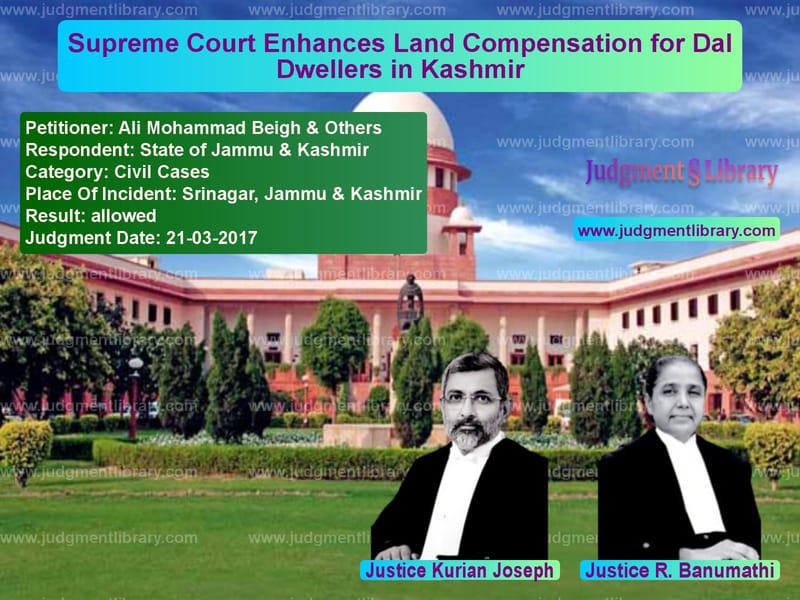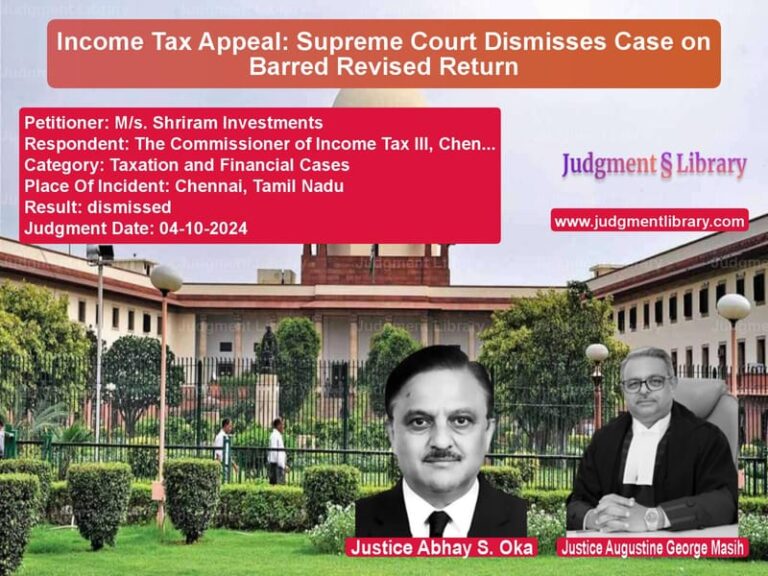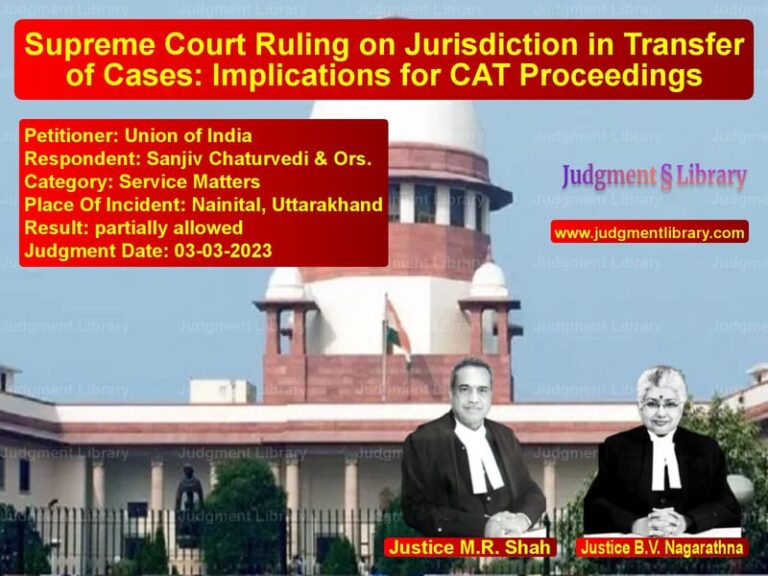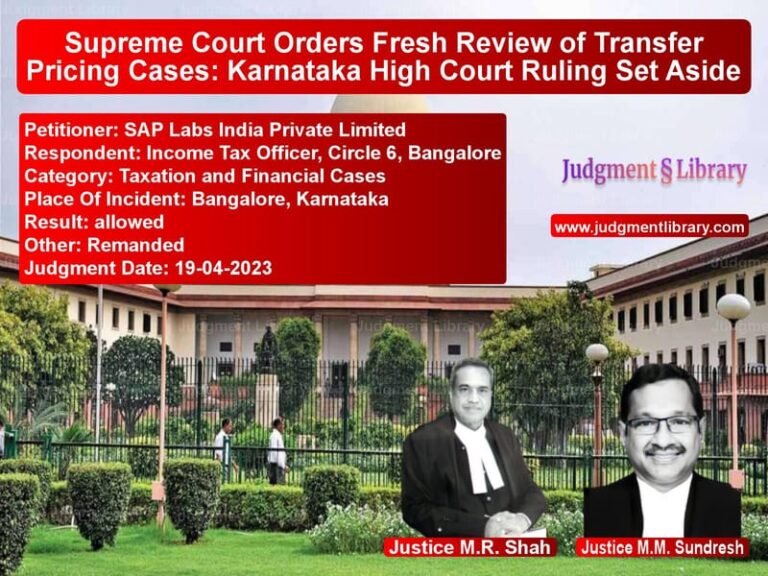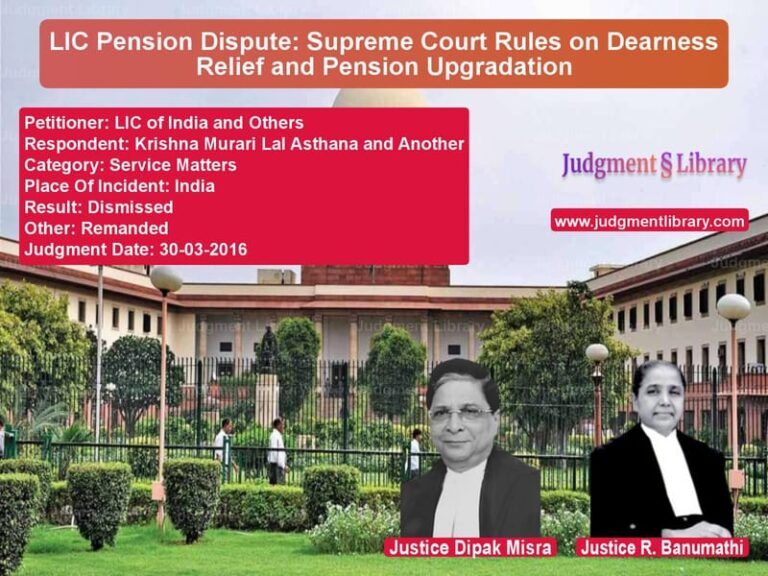Supreme Court Enhances Land Compensation for Dal Dwellers in Kashmir
The Supreme Court of India delivered an important ruling in Ali Mohammad Beigh & Others vs. State of Jammu & Kashmir, addressing the compensation awarded for land acquired for the resettlement of Dal dwellers. The Court ruled that the landowners in Chandapora, whose land was acquired at the same time and for the same purpose as land in adjacent villages, were entitled to the same rate of compensation as other landowners. The judgment corrected a disparity in compensation and ensured equal treatment of landowners in similar circumstances.
Background of the Case
The case arose from a land acquisition notification issued on June 16, 1997, by the Collector, Lakes and Waterways Development Authority (LAWDA), Srinagar, for acquiring 505 Kanal 06 Marlas of land in Chandapora, Tehsil and District Srinagar. The land was acquired to construct and develop a housing colony for resettling families displaced from the Dal Lake area.
The Land Acquisition Officer initially assessed the compensation at different rates:
- Rs.1,50,000/- per Kanal for Abi-Bagh (irrigated orchard land)
- Rs.1,40,000/- per Kanal for Abi-Awal (agricultural land)
- Rs.1,30,000/- per Kanal for Gair-Mumkin (barren land)
However, dissatisfied with this valuation, the landowners sought a reference under the Jammu & Kashmir Land Acquisition Act. The Reference Court revised the compensation, awarding Rs.2,50,000/- per Kanal, along with Rs.10,000/- per Kanal for fencing costs.
Despite this revision, the landowners filed an appeal seeking compensation of Rs.4,00,000/- per Kanal, arguing that similar land in neighboring villages, Bhagichandpora and Pazwalpora, was awarded Rs.4,00,000/- per Kanal. However, the High Court dismissed their appeal, holding that they had failed to present sufficient evidence to justify a higher rate.
Key Legal Issues
- Whether the landowners in Chandapora were entitled to the same compensation as those in Bhagichandpora and Pazwalpora.
- Whether the Reference Court was justified in awarding Rs.2,50,000/- per Kanal while similar landowners received Rs.4,00,000/- per Kanal.
- Whether the High Court erred in dismissing the claim for equal compensation.
Petitioner’s Arguments (Ali Mohammad Beigh & Others)
The appellants contended:
- Their land was identical to the land acquired in Bhagichandpora and Pazwalpora, and all three villages were adjacent.
- The inter-se distance between the villages was negligible, and there was no justification for awarding different compensation rates.
- The High Court had failed to consider precedents where adjacent landowners received Rs.4,00,000/- per Kanal.
- Tehsildar reports and witness testimonies supported the claim that the market rate was higher than Rs.2,50,000/- per Kanal.
Respondents’ Arguments (State of Jammu & Kashmir)
The respondents opposed the appeal, arguing:
- The landowners in Bhagichandpora and Pazwalpora had presented stronger evidence, including independent assessments, to justify Rs.4,00,000/- per Kanal.
- The appellants had failed to provide comparable sale deeds or valuation reports to substantiate their claim.
- The High Court correctly dismissed the appeal since there was no direct evidence supporting a higher valuation.
Supreme Court’s Observations
The Supreme Court examined the evidence and found that the villages of Chandapora, Bhagichandpora, and Pazwalpora were geographically adjacent and shared common land characteristics. The Court noted:
- The land acquisition was for the same purpose – resettlement of Dal dwellers.
- The lands in all three villages were identical in nature and use.
- The High Court had overlooked the fact that similar land had been valued at Rs.4,00,000/- per Kanal in adjacent areas.
The Court emphasized:
“When the lands are more or less situated nearby and when the acquired lands are identical and similar, it would not be proper to discriminate between the landowners unless there are strong reasons.”
The judgment also referenced previous cases, including:
- Union of India vs. Bal Ram (2010) 5 SCC 747, which held that lands acquired for the same purpose should be awarded uniform compensation.
- Union of India vs. Harinder Pal Singh (2005) 12 SCC 564, which stated that acquired lands forming a single unit should have consistent valuation.
The Court further observed:
“When the lands are acquired at the same time and for the same purpose, it would be unfair to discriminate between the landowners and pay less compensation to some while paying more to others.”
Supreme Court’s Ruling
- The Supreme Court set aside the High Court’s order.
- The compensation for the appellants was enhanced to Rs.4,00,000/- per Kanal, bringing it in line with the compensation awarded in Bhagichandpora and Pazwalpora.
- The appellants were also awarded 15% solatium (Jabirana) and all other statutory benefits.
- The review petition was also set aside.
The Court ruled:
“The appellants are at par with other landowners whose lands were acquired in Bhagichandpora and Pazwalpora in other references, and hence they are also entitled to enhanced compensation of Rs.4,00,000/- per Kanal.”
Key Takeaways from the Judgment
- The judgment ensures uniform compensation for similarly situated landowners.
- Courts must consider geographical proximity and land similarity when awarding compensation.
- Landowners should provide adequate evidence, such as sale deeds and valuation reports, to justify their compensation claims.
- The ruling establishes a precedent for fair compensation in land acquisition cases.
Conclusion
The Supreme Court’s ruling in Ali Mohammad Beigh vs. State of Jammu & Kashmir reaffirms the principle of equal treatment in land acquisition cases. By ensuring that landowners in Chandapora received the same compensation as those in neighboring villages, the Court upheld the principles of fairness and non-discrimination in government acquisitions. This judgment serves as an important precedent for future land compensation disputes, reinforcing the need for uniformity in valuation and legal consistency in awarding compensation.
Don’t miss out on the full details! Download the complete judgment in PDF format below and gain valuable insights instantly!
Download Judgment: Ali Mohammad Beigh & vs State of Jammu & Kas Supreme Court of India Judgment Dated 21-03-2017.pdf
Direct Downlaod Judgment: Direct downlaod this Judgment
See all petitions in Damages and Compensation
See all petitions in Landlord-Tenant Disputes
See all petitions in Property Disputes
See all petitions in Judgment by Kurian Joseph
See all petitions in Judgment by R. Banumathi
See all petitions in allowed
See all petitions in supreme court of India judgments March 2017
See all petitions in 2017 judgments
See all posts in Civil Cases Category
See all allowed petitions in Civil Cases Category
See all Dismissed petitions in Civil Cases Category
See all partially allowed petitions in Civil Cases Category

